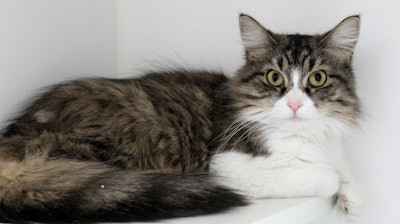
Scientists have found evidence that pet ownership benefits people’s health. Nevertheless, pop culture, from The Simpsons to Bob’s Burgers to The Office, frequently draws humorous connections between extreme cat fanciers and mental health issues. Often these jokes are at the expense of women marginalized by society. In reality, schizophrenia is a serious mental illness that involves a range of symptoms, including delusions, hallucinations and abnormal motor behavior, according to the National Institute of Health. While scientists have noted correlations, no definitive evidence proves that cat ownership causes mental health problems. A group of researchers went beyond the stereotypes and rumors by reviewing nearly 2,000 studies on incidents of psychotic events, schizophrenia and similar disorders. They found 17 studies for inclusion in their meta-analysis, published in in Schizophrenia Bulletin.
“Our findings support an association between cat exposure and an increased risk of broadly defined schizophrenia-related disorders,” University of Queensland, Australia researchers wrote in their paper. “However, the findings related to psychotic-like experiences as an outcome are mixed.”
After the researchers adjusted for other factors, they found that individuals exposed to cats had approximately twice the probability of developing schizophrenia compared to people who did not spend time around cats, reported Science Alert.
Their findings were inconclusive though, since many of the studies in their meta-analysis were of poor quality. The researchers called for increased study of the issue to explore the relationship between schizophrenia and cat ownership.
Research on exposure to cats and schizophrenia
Although the University of Queensland researchers found some evidence connecting mental health problems and exposure to cats, some of the studies contradicted each other. For example, a 1995 article also published in Schizophrenia Bulletin suggested that the disease may be zoonotic, or transferred from animals to people. The authors noted that rates of schizophrenia increased with house cat ownership during the past two centuries and that the mental health disorder was more common in communities that kept cats as indoor pets compared to groups that limited domestic cats to outdoors. However, an evaluation of this hypothesis noted that, “the theory is found to be weak in several areas stemming from inadequate description of both the relevant clinical population and the viral pathogenesis, as well as an incomplete examination of available data bearing on a hypothesized association between schizophrenia and cat ownership.”
Other studies have suggested that the parasite Toxoplasma gondii or other microorganisms may be responsible for cases of schizophrenia related to exposure to cats. This hypothesis suggests that bites of infected cats may transmit the parasite to people, but this connection is also unproven.
Schizophrenia and related mental illnesses are complex problems with potential influences from genetics, environment and a range of other factors. While exposure to cats may be one of these factors, definitive evidence of a cause-and-effect relationship hasn’t been firmly established.
















